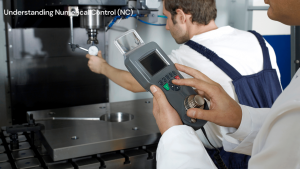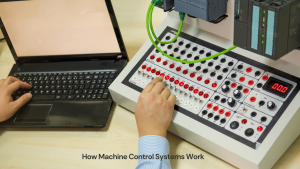Nach Technologie, Wir verweisen auf die Verwendung der neuesten Technologien- und Überwachungssysteme zur Durchführung der Maschinenregulierung und des Managements im Industriesektor, in erster Linie im Fertigung. Beinhaltet den Bau von Hardware- und Softwarekomponentensystemen, um den Betrieb von Maschinen zur Aufrechterhaltung der Genauigkeit zu überwachen, Effizienz, und Sicherheit. Im tatsächlichen Text der heutigen Fertigungsmuster, Einer der wichtigsten Faktoren ist es, Maschinen Prozesse auszuführen und anschließend höhere Produktionsniveaus zu erreichen.
Numerische Kontrolle verstehen (NC) und seine Anwendungen
Digitale Kontrolle, ein Maschinensteuerungsformular, das verwendet Computertechniken Um die Bewegung und den Betrieb der Maschine zu steuern, ist eine Form der numerischen Kontrolle. Es wurde erstmals in den 1940er Jahren entwickelt und veränderte die Fertigungsindustrie radikal zum Besser. Das NC -System ist in verschiedenen Prozessen beliebt, wie Mühlen, Drehmaschinen, Bohrmaschinen, und Mahlen. Sie ermöglichen es den Herstellern, die komplizierten Teile mit mehr Genauigkeit und der Möglichkeit zu machen, so oft wie möglich zu replizieren, Dadurch Verbesserung der Qualität der Produkte und die Verringerung der Zeit bis zur Produktion.

Robotik und seine Rolle bei der Maschinenkontrolle
Robotik ist ein spezialisierter Ingenieurfeld, der hauptsächlich die Entwicklung abdeckt, Programmierung, und Bereitstellung von Robotern. Die Automatisierung von Produktionsprozessen, die in der Fertigungsumgebung eingesetzt werden, ist eines der wichtigsten Ergebnisse von Robotern, da sie im Allgemeinen als Kontrollgeräte verwendet werden. Obwohl Roboter für industrielle Herstellungsprozesse Roboter, wie Cobots und AMRs, kann beschäftigt werden, Die Robotik -Technologie beschränkt sich nicht auf die Herstellung. Sie können für viele Jobs programmiert werden, z.B., Materialhandhabung, Montage, Schweißen, Malerei, Qualitätsprüfungen, etc. Roboter in den Maschinen-Kontrollsystemen haben zahlreiche Vorteile, einschließlich größerer Produktivität, höherwertiger Ausgangsleistung, niedrigere Arbeitskosten, und höhere Sicherheitsstandards.
Vorteile der Verwendung von Maschinensteuerungssystemen
Die Verwendung von Maschinensteuerungssystemen in Fertigungsproduktionen bietet mehrere Vorteile, die die Notwendigkeit effizienter und produktiver Vorgänge zusammenbringen. In erster Linie, Systeme für Maschinenlernen verringern die Produktivität, indem sie sich automatisch wiederholte Arbeiten erledigen und menschliche Fehler verhindern. Maschinen können aufgrund der Entbehrung von Pausen oder Ruhezeiten, die Menschen brauchen, endlos laufen. daher, Sie erzeugen eine schnellere Produktionsrate. Nächste, Diese maschinengesteuerten Systeme erhalten eine höhere Genauigkeit und Präzision, indem menschliche Fehler mit inkonsistenter Leistung und Variation minimiert werden. Dies würde die Produktqualität erhöhen und die Abfallreduzierung verringern. Außerdem, Solche Systeme können dazu beitragen, die Arbeitsausgaben zu reduzieren, indem man die manuelle Arbeit mit Hilfe automatisierter Prozesse beseitigt. Außerdem, Die Kontrollsysteme in diesen Maschinen senken auch die Möglichkeit von Unfällen und Verletzungen, wenn Menschen sie selbst betreiben.
Arten von Maschinensteuerungssystemen
Das verarbeitende Gewerbe setzt Maschinenbetriebssysteme in verschiedenen Bereichen ein, was zu erhöhter Wirksamkeit und Produktivitätsniveau führt. CNC-Maschinen (Computer Ziffernsteuerung), Auch als CNC -Maschinen bekannt, sind in Herstellungsprozessen wie Mahlen weit verbreitet, drehen, und Schleifen. Verschiedene solche Maschinen verwenden CNC -Steuerungssysteme, um diese Bearbeitungsprozesse perfekt durchzuführen, Analyse und Regulierung der Schneidwerkzeuge und Arbeitsstücke’ Bewegung zur höchsten Präzision und Wiederholbarkeit. Industrieanlagen, Wie die für Automobil- und elektronische Teile, Hoch automatisierte Prozesse über Computersteuerungssysteme, die die Montage von Teilen ermöglichen und Qualitätsstandards aufrechterhalten. Die effiziente Verpackungsproduktion wird erreicht, indem Packer mit Maschinensteuerungen verwendet werden, um den gesamten Prozess zu automatisieren, Dadurch erhöhen Sie den Durchsatz und reduzieren Fehler. Angenommen, Ihr Fertigungssystem enthält Förderbänder, Roboterarme, oder andere Materialhandhabungssysteme. In diesem Fall, Sie verwenden wahrscheinlich ein Maschinensteuerungssystem, um Materialien zwischen verschiedenen Produktionsphasen effizient zu transportieren und zu manipulieren. Es ist erwähnenswert, dass unser Unternehmen dazu beitragen kann, Maschinensteuerungssysteme zu entwerfen und zu installieren.
Wie Maschinensteuerungssysteme funktionieren
Die Entwicklung von Maschinenkontrollsystemen wird aufgrund des technologischen Fortschritts und der wachsenden komplexen Beziehung zur künstlichen Intelligenz zu einem technischen Prozess. Mit den zunehmenden technologischen Fortschritten, Automatisierte Steuerungssysteme werden so weit entwickelt, dass sie mehr Funktionen mit einer besseren Leistung bieten können. Mit AI -Anwendungen können Maschinen basierend auf Daten lernen und die erforderlichen intelligenten Entscheidungen treffen, Dies wird folglich die Arbeitsprozesse genauer optimieren. Was ist mehr, inmitten dieser Entwicklung, Wir können erwarten, dass die Robotik -Technologie das Niveau von voranschreitet Maschinensteuerung, Mit Robotern übernehmen komplexere Aufgaben und arbeiten mit Menschen in kollaborativen Räumen zusammen.

Bedeutung von Maschinensteuerungssystemen in der modernen Fertigung
Letztlich, Maschinenkontrollsysteme sind eines der wichtigsten Probleme in der heutigen Fertigung, da sie Abfall senken können, Produktion erhöhen, und Unfälle reduzieren. Solche Systeme helfen den Herstellern, ein höheres Produktivitätsniveau zu erreichen, indem sie Prozesse automatisieren/menschliche Fehleingänge reduzieren. Die Unterstützung in den beiden ist eine verbesserte Genauigkeit und Präzision verbessert, Dies erzeugt letztendlich eine höhere Produktqualität und reduzierte Abfälle. Ein weiterer Faktor ist, dass die Anwendung von Maschinenbausystemen die Arbeitskosten senkt und die Sicherheit des Arbeitnehmers senkt, indem man manuelle Arbeit durch automatisierte Systeme ersetzt. Da sich die Technologie ständig entwickelt, Maschinensteuerungssysteme werden inkrementell an Bedeutung gewonnen und die Mittelstücke des zukünftigen Industriesektors sein.
